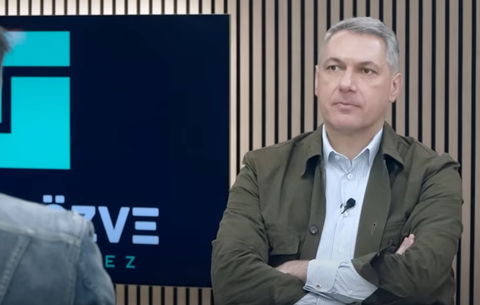Hysteria and overreaction in the Magyar Garda affair
The anti-fascists' overreaction to Arrow Cross-inspired initiatives risk provoking a boomerang effect. An insignificant, peripheral Hungarist micro-grouping has just been given billions of forints' worth of free advertising. To the hyperventilators we say keep calm! You'll achieve more that way.
The founding members of the Magyar Garda have sought protection from the President in response to Ferenc Gyurcsany's request that public prosecutors keep a close eye on the far-right grouping. As a private citizen and as a voter, I, too, condemn the stated aims of this Jobbik subsidiary. But as a free-thinking liberal, I believe they have the right to express their views, however revolting they may be. Attempts at banning them without any kind of legal basis for so doing look hurried and even somewhat undemocratic.
If a Brasilian, an Icelander or a Senegali were glancing at the latest headlines from the Hungarian Press Agency MTI, he would probably conclude that our country is teetering on the brink of a neofascist military coup. Rampaging storm troopers on the streets are apparently posing a real threat to the lives of peaceful Jews, Roma, gays and left-liberal politicians. Nazi-style parties supposedly enjoy real popular support and are about to bring an end to Hungary's democracy.
This is what we would have to conclude from a letter written by the presidents of the World Jewish Congress and the European Jewish Congress to Ferenc Gyurcsany, which claims, among other things, that the Magyar Garda, established by the anti-semitic and homophobic Jobbik party, which enjoys poll ratings in the tenths of a per cent range, "poses dangers for European democracy." In response, the prime minister turned to the senior prosecutor, saying: "I share the view of those who believe the establishment of the Magyar Garda gives rise to threats to our most important common values: respect for human dignity, the right to a life free from fear, and respect for others' cultures, ethnic origins, and world views."
Jewish communities had been saying for weeks that it was outrageous that any MP should think it "permissible for a violent group to exist that parades in a uniform reminiscent of that worn by the fascist movement." Another statement read, "The Alliance of Jewish Communities in Hungary trusts the government will find a constitutional way of acting against this and other similar groups."
And all of this because of an 'Arpad Jugend' set up by a party with a few hundred - a few thousand at most - members. This could be called an overreaction. This is hysteria. Jewish civic groups have the right to release any official statement they like. The Alliance is welcome to believe that the Magyar Garda is an illegal organisation. (And it would be hard to say that their belief is wholly incorrect).
But that's not how the state and the justice system work. So long as the party or its 'military' wing don't break any laws, there is no means of banning it. Which makes Ferenc Gyurcsany's letter to the prosecutor's office somewhat worrying. It is wrong for a politician to seek to bring to bear influence on the justice system. In a functioning democracy, the prosecutor knows what to do without receiving any instructions from politicians. Political interventions tend to have unintended consequences. Furthermore, a democracy can integrate its extremists into the mainstream, by giving them the opportunity to make their views known in an organised fashion. This is something a dictatorship cannot do even with a moderate opposition.
It doesn't take an officially registered organisation to beat up Jews or blow up synagogues. Osama bin Laden never registered al-Qaeda. People seeking a ban on the Magyar Garda are advocating something that would be counterproductive for a democracy. It is perfectly possible that some members of the Jobbik tend towards violence, just as there are fundamentalists within German's Muslim communities. But, please, is it not easier to keep an eye on them if they are still in the open, sitting there alongside their lest vehement comrades?
The Magyar Garda is composed of young extremists. But this does not mean every one of them wants to go around beating people up and setting things ablaze. It is surely better to let them release tension by playing around in their own sub-culture instead of forcing them into illegality by banning their organisation. Another benefit is that in a legal organisation, the real hard cases tend to be pushed to the margins.
László Tamás Papp
If a Brasilian, an Icelander or a Senegali were glancing at the latest headlines from the Hungarian Press Agency MTI, he would probably conclude that our country is teetering on the brink of a neofascist military coup. Rampaging storm troopers on the streets are apparently posing a real threat to the lives of peaceful Jews, Roma, gays and left-liberal politicians. Nazi-style parties supposedly enjoy real popular support and are about to bring an end to Hungary's democracy.
This is what we would have to conclude from a letter written by the presidents of the World Jewish Congress and the European Jewish Congress to Ferenc Gyurcsany, which claims, among other things, that the Magyar Garda, established by the anti-semitic and homophobic Jobbik party, which enjoys poll ratings in the tenths of a per cent range, "poses dangers for European democracy." In response, the prime minister turned to the senior prosecutor, saying: "I share the view of those who believe the establishment of the Magyar Garda gives rise to threats to our most important common values: respect for human dignity, the right to a life free from fear, and respect for others' cultures, ethnic origins, and world views."
Jewish communities had been saying for weeks that it was outrageous that any MP should think it "permissible for a violent group to exist that parades in a uniform reminiscent of that worn by the fascist movement." Another statement read, "The Alliance of Jewish Communities in Hungary trusts the government will find a constitutional way of acting against this and other similar groups."
And all of this because of an 'Arpad Jugend' set up by a party with a few hundred - a few thousand at most - members. This could be called an overreaction. This is hysteria. Jewish civic groups have the right to release any official statement they like. The Alliance is welcome to believe that the Magyar Garda is an illegal organisation. (And it would be hard to say that their belief is wholly incorrect).
But that's not how the state and the justice system work. So long as the party or its 'military' wing don't break any laws, there is no means of banning it. Which makes Ferenc Gyurcsany's letter to the prosecutor's office somewhat worrying. It is wrong for a politician to seek to bring to bear influence on the justice system. In a functioning democracy, the prosecutor knows what to do without receiving any instructions from politicians. Political interventions tend to have unintended consequences. Furthermore, a democracy can integrate its extremists into the mainstream, by giving them the opportunity to make their views known in an organised fashion. This is something a dictatorship cannot do even with a moderate opposition.
It doesn't take an officially registered organisation to beat up Jews or blow up synagogues. Osama bin Laden never registered al-Qaeda. People seeking a ban on the Magyar Garda are advocating something that would be counterproductive for a democracy. It is perfectly possible that some members of the Jobbik tend towards violence, just as there are fundamentalists within German's Muslim communities. But, please, is it not easier to keep an eye on them if they are still in the open, sitting there alongside their lest vehement comrades?
The Magyar Garda is composed of young extremists. But this does not mean every one of them wants to go around beating people up and setting things ablaze. It is surely better to let them release tension by playing around in their own sub-culture instead of forcing them into illegality by banning their organisation. Another benefit is that in a legal organisation, the real hard cases tend to be pushed to the margins.
László Tamás Papp









